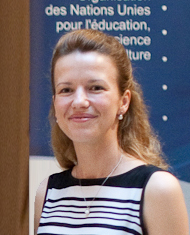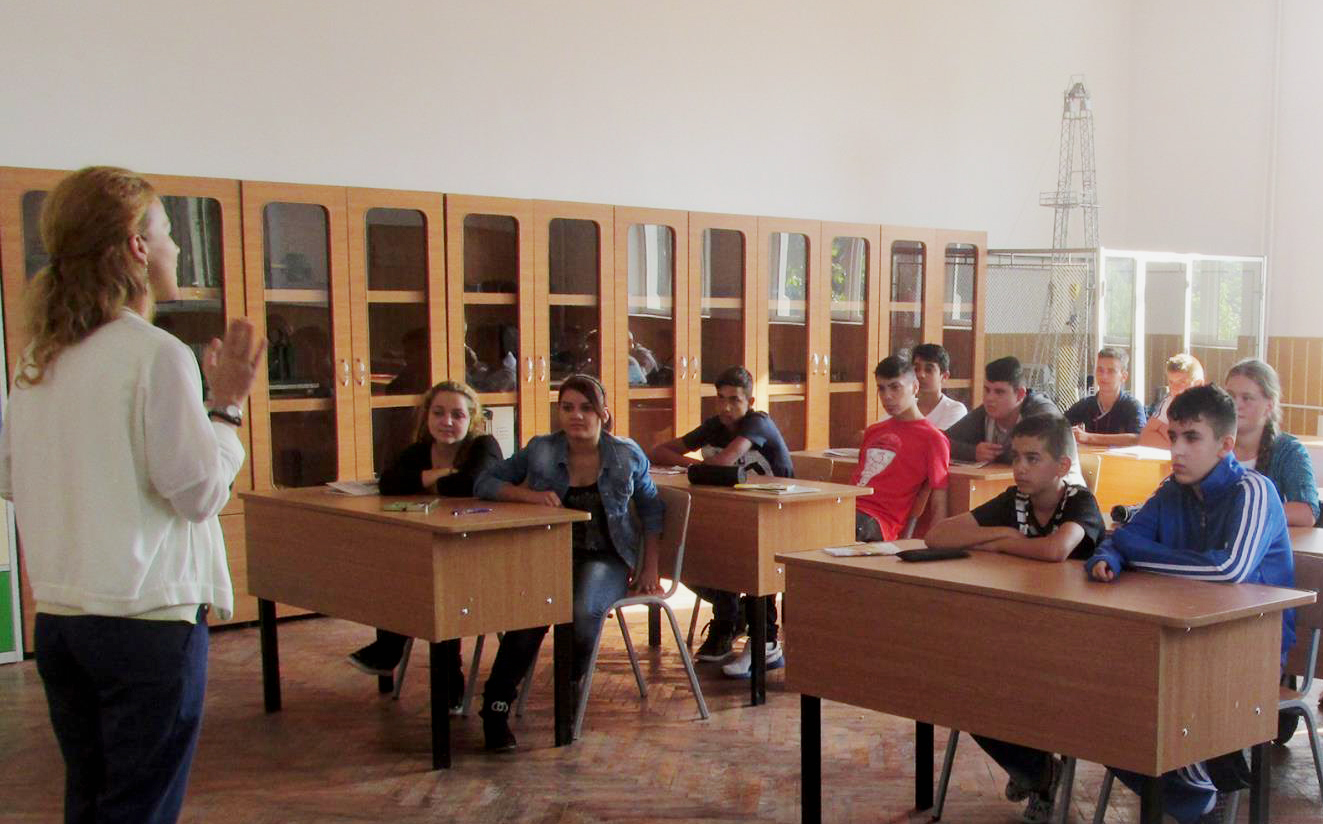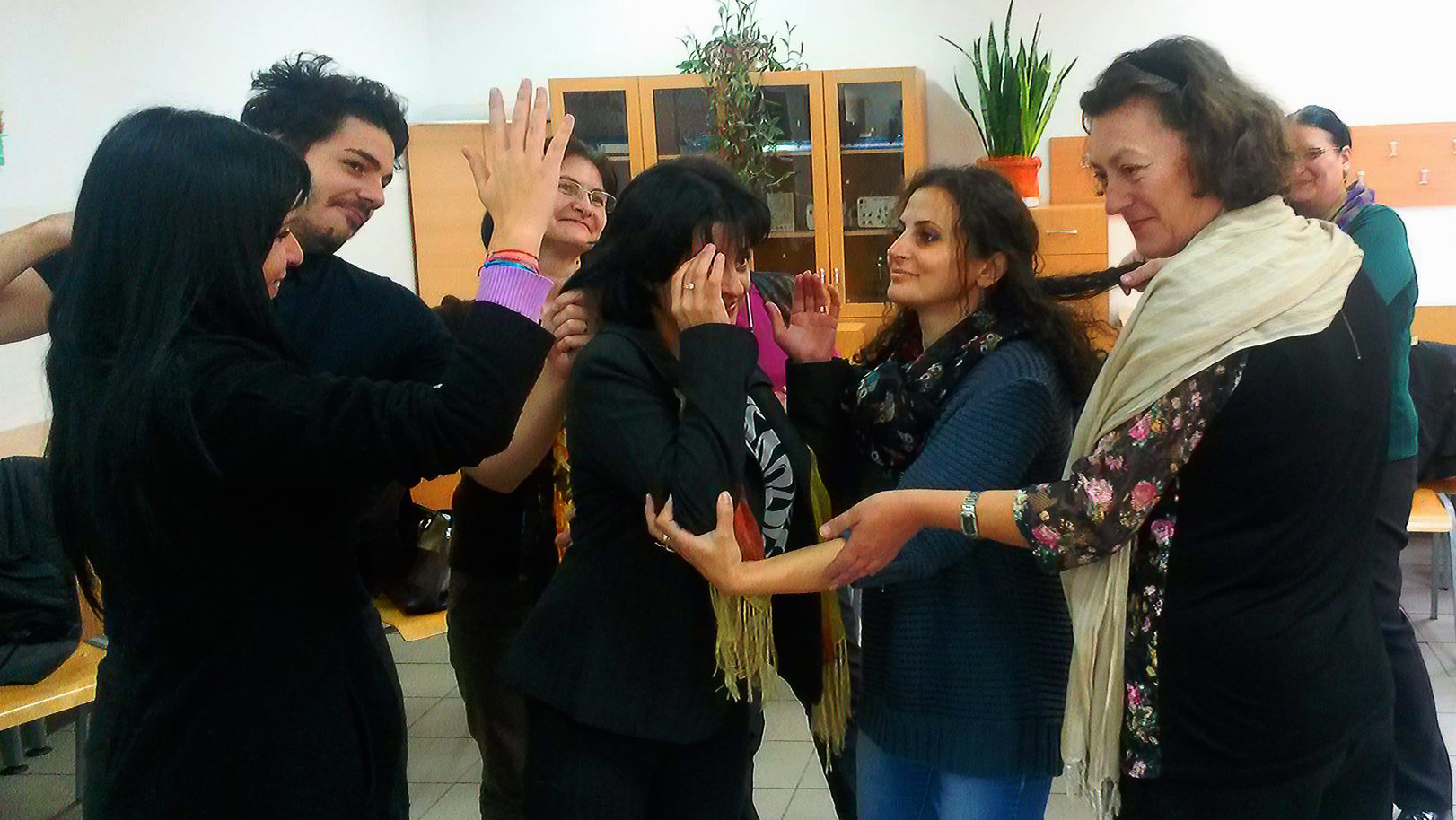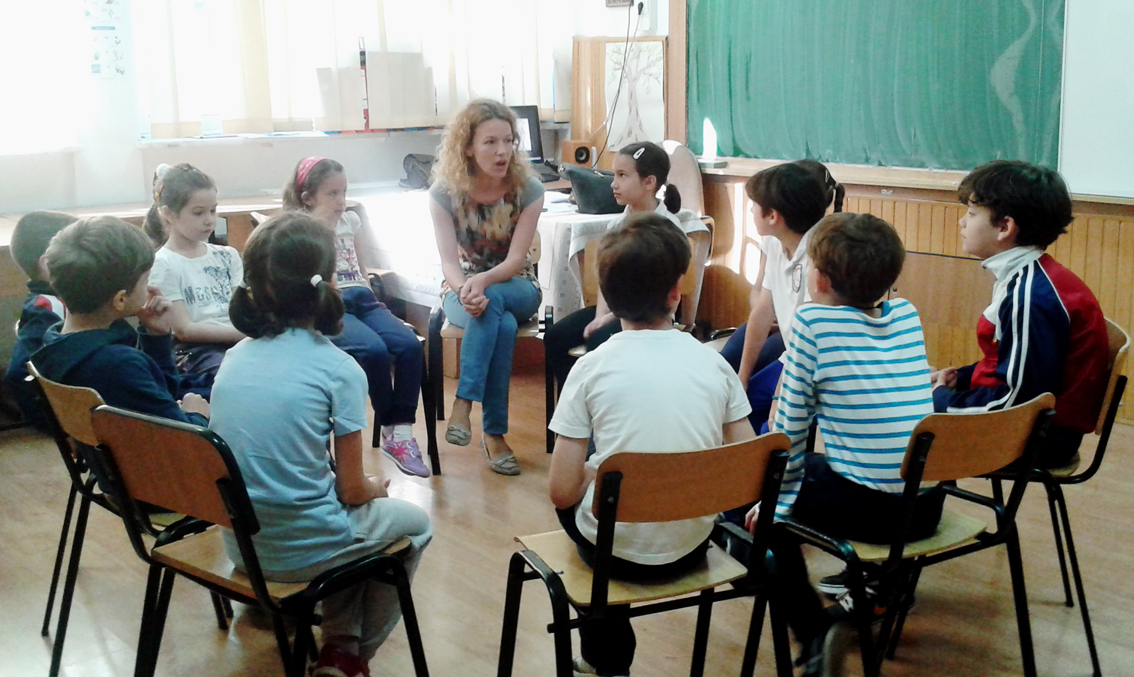
Laura Molnar is a trainer of the Learning to Live Together Programme (LTLT) and has become the driving force behind its implementation in the Romanian formal education system.
Laura comes from a little mountain town in Transylvania, Romania, but she is currently based in Bucharest. Her journey with the LTLT Programme started in 2009 when, while working as a psychologist for disadvantaged children, she was trained in a basic workshop in Geneva. With this new set of knowledge and skills, she started implementing the LTLT approach with the children she worked with. One year later she was selected to participate in the International Train the Trainers course organized by Arigatou International Geneva, which led her to a certification as a LTLT trainer.
In 2013 Laura took a big step. She found the opportunity to systematically implement the LTLT manual in the Romanian formal education sector. Her endeavor was supported by Sol Mentis Association in partnership with Arigatou International Geneva and the UNESCO National Commission in Romania.
In 2014, she facilitated the first online course for trainers provided by Arigatou international Geneva. Many years after her first workshop, Laura keeps learning and studying to improve her skills:
“I consider my training is not finished. Every new chance to cooperate with the Arigatou International Geneva team, each course I organize for teachers, and each session with children brings new knowledge. Each day I learn how to be an ethical person and a role model for others.”

1. What motivated you to become a trainer?
When I participated in the first Basic Training Workshop, back in 2009, I found not only a new tool for my work with children, but also committed people and a new approach of life: empathetic and respectful for the others and open to all religions or cultures.
After a few months I was invited as co-facilitator to a Basic Training Workshop in Bucharest. The positive feedback received after the training from Agneta Ucko, the former director of Arigatou International Geneva, and being encouraged by Marta Palma, former GNRC Coordinator for Europe, inspired me to continue my work as trainer.
Each workshop gave me new learnings, new understanding on the LTLT approach, and new energy and motivation to continue. The positive results I saw during this period were a strong motivation to find opportunities to make this method more accessible for the Romanian teachers and students.
2. You got accreditation from the Ministry of Education for the trainings on the Learning to Live Together, how did you get the accreditation and what does this accreditation mean?
The process lasted 6 months. I started with a research of the teacher’s and student’s needs, which justified the necessity of ethics education in schools. I presented a file to the Ministry of Education’s Accreditation Commission including information about the trainer’s team, the administrative and management team, the program curricula (objectives, competences, timetables, methodology, evaluation forms) and the course support. The teachers that participate in the 42 hours course and prepare portfolios for the final evaluation receive 11 credits from the Ministry of Education.
3. What is the spread and impact of your work?
Until now we have organized 18 courses where more than 450 teachers got familiar with the LTLT approach and developed their abilities to use the manual in their activities with children. Last year I started the LTLT implementation in some schools with two to three teachers in each of them. After seeing the changes in the children and in the dynamic of the class, more teachers became interested to be involved in our ethics education program.
In September 2015, more than 47 teachers from Bucharest, Dambovita and Dolj started implementing the LTLT in a systematic way. More than 1400 students from primary, secondary and high schools are involved in ethics education programs this year.

4. Can you give us an example of the impact of your work in some of the schools?
Aletheea is a new school that opened in 2014. Since the beginning, students and teachers have been systematically introduced to different elements from the LTLT trainings, like the “Learning Logs” for the students and the “Reflection Logs” for the teachers to monitor the children’s evolution.
LTLT was used in the students’ morning meetings and as an optional course. Teamwork and participative methods are being used in different disciplines to nurture the students’ abilities to cooperate and to encourage them to express their opinions. Learning based on empathy and care for the needs of others is being promoted through social projects and visits to different centers for disadvantaged children. This has had a major impact on students.
The monitoring process showed that aggressive or individualist attitudes were replaced with nonviolent alternative to solve conflicts, with cooperation and mutual support. Students became more sensitive to the needs of others and gained more self-confidence after helping disadvantaged children or exercising their abilities to express their opinions.
5. Tell us about the social issues that affect children in the places where you are implementing the LTLT.
The context and the motivation of the schools which decided to use LTLT were different: intercultural and interreligious contexts, bullying, exclusion, and aggressive attitudes among students. We have involved in our program children from different ethnicities, cultures, social levels and religions.
We noticed that their learning needs are independent of their social status, religious, cultural or ethnic backgrounds. Their needs are related to developing their social abilities, their responsibility, their empathy and respectful attitudes, to change their discriminative and aggressive behaviours towards others, to get familiar with ethical role models, to perceive the reality around them and use adequate techniques to solve conflicts.

6. Tell us about the main challenges that you have encountered as a trainer.
One of the main challenges I had was creating Communities of Practice (CoP) with teachers who implemented LTLT in a systematic way. However, we managed to organize two events that were appreciated for both teachers and students. I tried to create an experience exchange between teachers who implement LTLT by disseminating all their activities, achievements, students’ initiatives and best practices in a quarterly newsletter of the program.
The big number of the children in each class and the lack of spaces for activities was another challenge which made necessary the adjustment of the activities.
The teachers’ high workload and lack of time for preparation of the sessions was another challenge which we overcame this summer by preparing a set of model sessions for each kiosk. This will allow the teacher to choose the ones that are more appropriate and relevant for the needs of their students.
7. What are the next steps in the work you are doing with the LTLT?
One of my main objectives for the future is to increase the number of teachers who implement LTLT in each school, in order to bring changes at the institutional level. I also want to make the facilitation support team to grow as we have an increasing number of teachers implementing in Bucharest, Ilfov, Dambovita and Dolj areas. For the next year, I will propose to introduce in some classes’ curricula an optional course of ethics education.
This year, I plan to organize more projects or events to bring together teachers and students from different schools. I also intend to consolidate the Community of Practice through different courses or trips which could offer space for teachers to share their experiences.
“The added value to the LTLT approach is the trainers who promoted the method and the wonderful people who inspired me in GNRC. That’s why I think that being a LTLT trainer is a big responsibility which involves an ethical style of life, a continuous development of facilitation abilities and openness to learn more about peace building, your own identity and also others each day.”
